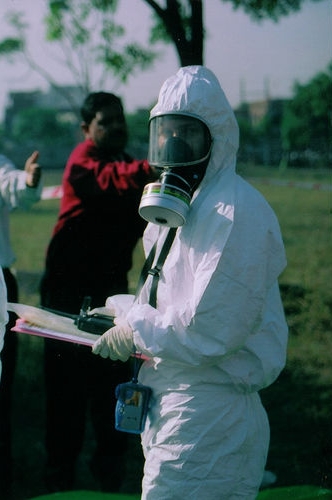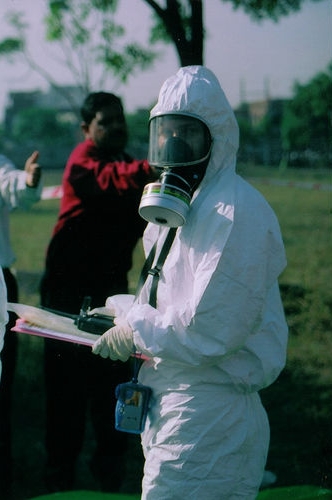Today is the 25th anniversary of the Methyl Isocyanate (MIC) leak at the Union Carbide plant in Bhopal, India. The number of people affected, injured, and killed has been the subject of debate. But it seems clear that a half a million were exposed to some degree to MIC and other chemicals released and approximately 40,000 people died either immediately or from injuries directly related to the accident. MIC was a key ingredient in India’s petrochemical Green Revolution — an intermediate chemical in the production of a number of insecticides, some still in use today.
 On site of the former Dow Chemical’s plant in Bhopal in 2002.Photo and caption courtesy Ascanio via Flickr Union Carbide still claims the MIC release was an act of deliberate sabotage and that “it” was the victim at Bhopal. This giant-chemical-corporation-as-victim delusion is symptomatic of our time; the end-of-free-market capitalism in which corporations have become too big to fail, too powerful to be held accountable.
On site of the former Dow Chemical’s plant in Bhopal in 2002.Photo and caption courtesy Ascanio via Flickr Union Carbide still claims the MIC release was an act of deliberate sabotage and that “it” was the victim at Bhopal. This giant-chemical-corporation-as-victim delusion is symptomatic of our time; the end-of-free-market capitalism in which corporations have become too big to fail, too powerful to be held accountable.
So why remember the Bhopal tragedy on this 25th anniversary, aside from respect for all its victims?
I believe the Bhopal tragedy offers us some insights and lessons in our struggle to build true community food security today.
In the years after the tragedy, I encountered countless “near Bhopal scale” incidents in the U.S. chemical industry. At Bhopal’s sister MIC facility in Institute, W.Va., an emergency inspection of the unit found three of the four redundant safety systems disabled — the same as at Bhopal. A hydrofluoric acid spill in Texas City, Texas came within 6 inches of killing 50-100,000 people downwind. The petrochemical industry has a long record of valuing production and profits over safety. I believe they have made a calculation that the costs of an accident or an exposure are miniscule compared to the career building profits possible from a kind of “what can I get away with?” attitude towards production and safety.
Indeed, the record suggests they are right. No one has been held accountable for the Bhopal tragedy. Token payments have been made to some victims, but Union Carbide has never claimed responsibility for the failure. This denial is part of an agrichemical industry strategy to escape the costs of corporate irresponsibility or at least delay them long enough to allow current management to retire blameless.
In Michigan, where I live, Dow Chemical (now owner of Union Carbide) has fought a shameful battle against residents of the Midland and the Tittabawasee River basin exposed to very high levels of dioxins and furans. Dow’s goal has been to avoid responsibility for at least a quarter century of contamination while claiming it now acts with the highest standards of safety.
In the west end of Louisville, Ky., in an industrial area known as Rubbertown, Dupont exposed largely African-American chemical workers to hazardous chemicals for decades. One Dupont manager reportedly said that the corporation would resist settling a class action lawsuit based on this poisoning until “all the plaintiffs were dead.”
I could go on and on with stories like these based on my two decades of work investigating the petrochemical industry. What is important for us today is to realize the large corporations that monopolize conventional industrial agriculture today aren’t going to suddenly change when they “see the light”. From the Dead Zone in the Gulf of Mexico to the health of agricultural workers to consumer exposure to unsafe ingredients, these corporations have too much liability, too much to lose to engage in real negotiations about changing the way our nation farms.
Petrochemical domination of conventional and industrial farming is based on a fundamentally wrong paradigm of destruction of life in the soil. Living soil is seen as the enemy. Their goal is organism-free dirt that functions as a medium to deliver human-made inputs and nutrients. This extraordinary mistake has produced record amounts of production (not food) in the very short-term while reducing carrying capacity in the long term and causing almost unimaginable damage in the process.
If a realistic calculation were done to assess the total environmental, economic, and public health damage done by agricultural chemical and industrial corporations, the sum would exceed the book value of the corporations responsible.
So, if the food security of our nation depends, in some critical measure, on the scale and speed of a transition to sustainable farming using 80 percent less petroleum, that protects water quality and conserves water quantity through organic growing practices based on healthy, living soil, what are we do to about the corporate inheritors of the legacy of Bhopal?
I propose we look to South Africa for a solution. When apartheid was abolished and Nelson Mandela was released after 27 years in prison, the new South Africa was confronted with legacy of repression, torture, and death caused by its own citizens. There surely must have been a very strong temptation to take revenge.
But a Truth and Reconciliation Commission was created instead. The goal was to make public the “truth” about what had happened under apartheid — to grant amnesty to virtual all responsible for past actions. The “truth” was important to help the new nation find a path forward.
We are in a similar moment with regard to industrial, petrochemical intensive conventional agriculture. Though its corporate proponents still rule in Washington like South African President de Klerk ruled in Pretoria, change from the ground (literally the soil, in our case) is coming.
We need our own version of the Truth and Reconciliation Commission for agriculture, one that helps conventional farmers see not only how they have been victimized by the agricultural petrochemical industry, but helps them chart a new path ahead. We also need to grant amnesty to those corporations that stop producing the most damaging, most resilience destroying chemicals. Short of consumers marching on agrichemical corporate headquarters with pitchforks and torches, I don’t see any better way of making this change.
We need to acknowledge what has happened is wrong. Forgive and move swiftly in the right direction (because of our survival requires it of us). That is the lesson of Bhopal that I see.
I still dream of what it must have been like that night of Dec. 3 in Bhopal’s crowded neighborhoods pressed up against the Union Carbide plant. The choking. The panic. The crush and trampling. The long-term suffering of those who didn’t die immediately. We must remember those victims.


